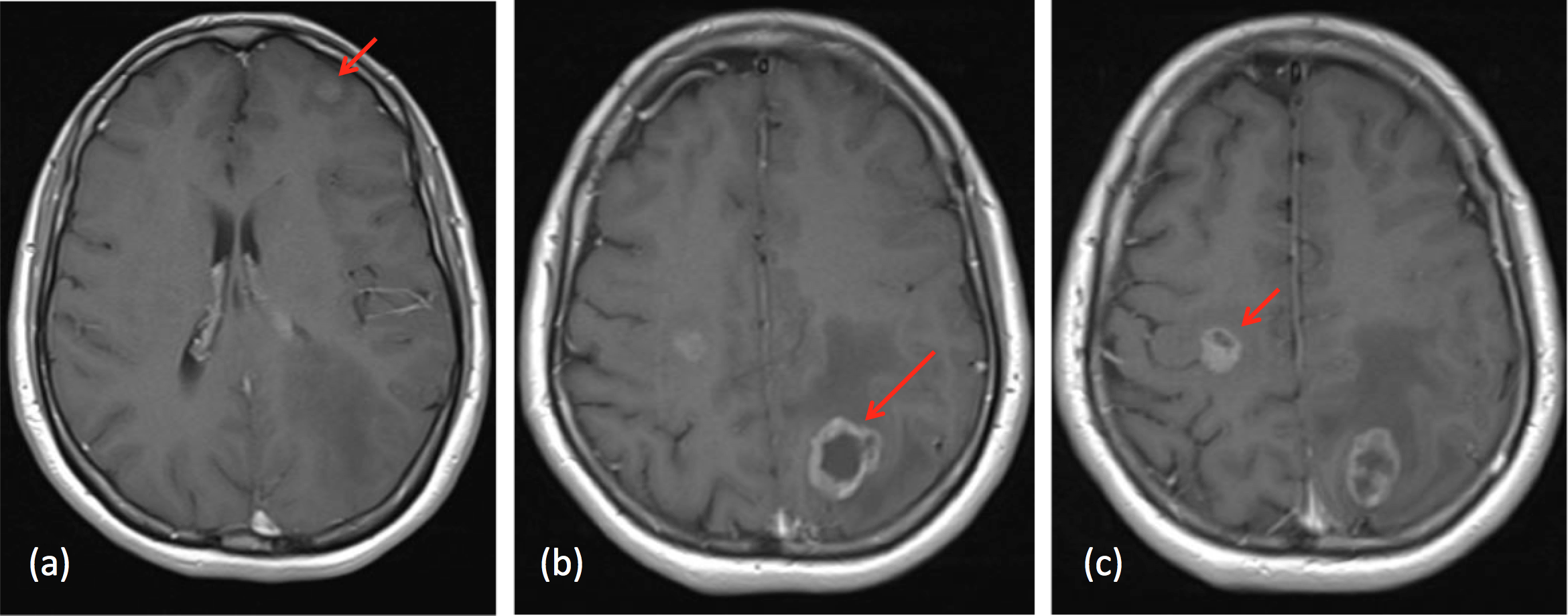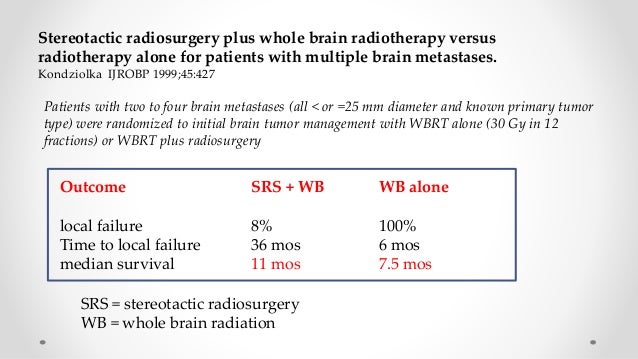Whole Brain Radiation Therapy Survival Rate
Whole brain radiation therapy wbrt helps control the growth of brain metastases in patients with 1 to 3 small brain metastases but it does not significantly extend patient survival according to the results of a phase iii trial presented at the 2015 american society of clinical oncology asco annual meeting held may 29 to june 2 in chicago. However whole brain radiation therapy has been recognized to cause considerable permanent side effects mainly in patients over 60 years of age my wife was 66 years of age.
 Treatment And Outcomes Of Patients In The Brain Metastases In
Treatment And Outcomes Of Patients In The Brain Metastases In
www.sciencedirect.com
Those at increased risk for long term radiation effects are adults over 50 years of age.

Whole brain radiation therapy survival rate. The use of wbrt has decreased somewhat in recent years due to both advances in radiation technology. Patients were randomly assigned to receive radiosurgery alone or radiosurgery followed by whole brain radiation wbrt. About 200000 patients with brain tumor are treated with either partial large field or whole brain radiation every year in the united states.
Whole brain radiation can induce neurological deterioration dementia or both. Although efficacious combined modality therapy has been abandoned by most physicians due to reports of neurotoxicity in patients who received it. Historically brain metastases have been treated with whole brain radiation therapy.
Craniospinal irradiation has not been frequently used in the treatment of pcnsl. Whole brain radiotherapy wbrt is usually avoided in the initial treatment of patients with primary central nervous system lymphoma pcnsl. Whole brain radiotherapy wbrt is a mainstay of treatment in patients with both identifiable brain metastases and prophylaxis for microscopic disease.
Whole brain radiotherapy should be avoided in patients with brain metastases because it does not prolong survival it reduces quality of life and it causes cognitive decline. Radiation therapy the most commonly used for the treatment of brain tumors has been shown to be of major significance in tu mor control and survival rate of brain tumor patients. Estimates suggest that 2040 of patients with malignant neoplasms develop brain metastases bms during their illness the lung is the most common primary site leading to bms followed by the breast whole brain radiotherapy wbrt is a standard treatment used to improve neurologic deficits caused by the bms and surrounding edema and to prevent further deterioration of.
All patients underwent cognitive testing before treatment and 3 months after treatment. However whole brain radiation is associated with cognitive side effects and studies of non small cell lung. Survival curves for primary central nervous system lymphoma patients treated with whole brain radiation n958 and those treated with partial brain radiation n85.
The trial enrolled 213 patients with limited brain metastases defined as between 1 and 3 metastases that were smaller than 3 cm in diameter.
 Multidisciplinary Management Of Breast Cancer Brain Metastases
Multidisciplinary Management Of Breast Cancer Brain Metastases
www.cancernetwork.com
 Clinical Outcomes In Patients With Brain Metastases From Breast
Clinical Outcomes In Patients With Brain Metastases From Breast
thejns.org
 Dexamethasone And Supportive Care With Or Without Whole Brain
Dexamethasone And Supportive Care With Or Without Whole Brain
www.thelancet.com
 Cureus Radiation Necrosis A Growing Problem In A Case Of Brain
Cureus Radiation Necrosis A Growing Problem In A Case Of Brain
www.cureus.com
 Radiosurgery For Brain Metastases
Radiosurgery For Brain Metastases
www.slideshare.net
 Pdf Estimating Prognosis At The Time Of Repeat Whole Brain
Pdf Estimating Prognosis At The Time Of Repeat Whole Brain
www.researchgate.net
Management Of Brain Metastases Page 3 Of 4 Cancer Network
www.cancernetwork.com
 Recent Advances In The Biology And Treatment Of Brain Metastases
Recent Advances In The Biology And Treatment Of Brain Metastases
esmoopen.bmj.com
0 Response to "Whole Brain Radiation Therapy Survival Rate"
Post a Comment